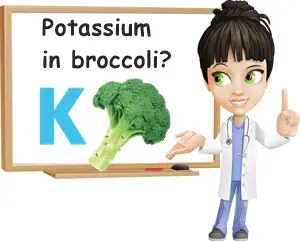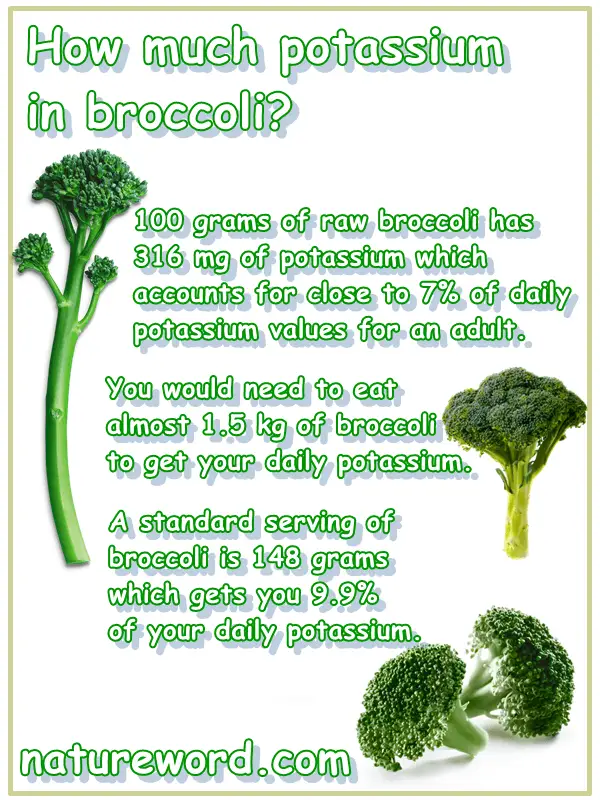Broccoli is what you eat when you want to be healthy. In addition to being an anti-inflammatory food, and a source of anticancer organic sulfur compounds, what makes broccoli good to eat is its nutrition. Broccoli is low in calories, high in vitamins C and K, and a good source of several B vitamins, manganese, phosphorus and especially potassium. The potassium content of broccoli is a valuable source of important benefits for health, albeit insufficiently stressed compared to other nutritional facts.

How much potassium in broccoli?
- There are 316 mg (milligrams) of potassium in 100 grams (g) of raw broccoli.
- There are 284 mg of potassium per one cup of raw broccoli at an estimated weight of 90 grams a cup.
- There are 468 mg of potassium per one serving (148 grams) of raw broccoli.
- There are 328 mg of potassium per 100 g of broccoli, cooked from fresh, with no added fat.
- There are 508 mg of potassium per one cup (155 grams) of broccoli, cooked from fresh, with no added fat.
- There are 293 mg of potassium in 100 grams of broccoli, boiled and drained, with no added salt.
- There are 229 mg of potassium per half a cup (78 grams) of broccoli, boiled and drained, no added salt.
- There are 458 mg of potassium per one cup (155 grams) of broccoli, boiled and drained, no added salt.
Is broccoli high in potassium?
Broccoli potassium content is moderately low. Nonetheless, the vegetable represents a good food to get your daily potassium from considering it’s readily available, in season all year long, and generally safe to eat. You can eat broccoli almost every day without major risks or side effects, except for mild digestive upset, unless there are pre-existing health problems such as thyroid issues.

How high in potassium is broccoli?
- 100 grams of raw broccoli provides 6.7% of daily potassium values for the average adult.
- 1 cup (90 grams) of raw broccoli provides 5.2% of daily potassium values for the average adult.
- 1 serving of raw broccoli (148 grams) provides 9.9% of daily potassium.
- 100 grams of broccoli, cooked from fresh, no added fat, provides 6.97% of daily potassium.
- 1 cup (155 grams) of broccoli, cooked from fresh, no added fat, provides 10.8% of daily potassium.
- 100 grams of broccoli, boiled and drained, no added salt, provides 6.25% of daily potassium.
- Half a cup (78 grams) of broccoli, boiled and drained, no added salt, provides 4.87% of daily potassium.
- 1 cup (155 grams) of broccoli, boiled and drained, no added salt, provides 9.8% of daily potassium.
Broccoli potassium content vs other foods
- Broccoli potassium content:
100 grams of raw broccoli provides an estimated 6.7% of daily potassium values for the average adult.
- Brussels sprouts potassium content:
100 grams of Brussels sprouts provides 8.3% of daily potassium.
- Beet leaves (beet greens) potassium content:
100 grams of cooked beet leaves provide over 16% of daily potassium values.
- Bananas potassium content:
Bananas provide an estimated 7.6% of daily potassium values for the average adult.
- Avocado potassium content:
100 grams of avocado provides 10.3% of daily potassium values for the average adult.
- Apples potassium content:
By comparison, 100 grams of apple with skin will only get you less than 2.3% of daily potassium.
- Fava beans (broad beans) potassium content:
100 grams of fava beans provides 23% of daily potassium values.
- Butternut squash potassium content:
100 grams of butternut squash provides 7.5% of daily potassium values.
- Orange juice potassium content:
100 milliliters of orange juice provides 4.25% of daily potassium values.
- Cashews potassium content:
100 grams of cashews provides 14% of daily potassium values.
- Chestnuts potassium content:
100 grams of chestnuts provides a little over 10% daily potassium values.
See also :
How much broccoli do you have to eat to get your daily potassium?
To get all of your daily potassium requirements from broccoli alone, you would have to eat almost 1.5 kilograms (kg) of the vegetable. However, the recommended serving for broccoli is 148 grams which accounts for only 9.9% of all of your daily potassium.
Is it good to eat broccoli every day?
While you can definitely eat broccoli every day for some time, it’s not the best idea to eat it absolutely every single day for the rest of your life. Why is broccoli not good for you? For one, some of the same compounds in broccoli responsible for its beneficial effects for health can also be a source of side effects.
For example, organic sulfur compounds in broccoli have scientifically proven anticancer properties, but at the same time, studies show these same compounds have goitrogenic effects causing goiter.
Broccoli is also naturally high in vitamin K with a vitamin K content of close to 100% of daily requirements per 100 grams. While vitamin K is an excellent anti-inflammatory compound, it is also involved in blood clotting and can pose health risks for those with a predisposition for blood clots, especially those receiving anticoagulant medication.
You might be interested to know:
Is Eggplant High In Potassium?
What are the benefits of eating broccoli?
If you are looking towards broccoli to meet your daily potassium requirements, then you are in for many benefits. For one, the good content of potassium in broccoli helps lower high blood pressure numbers. Small amounts of magnesium together with the potassium combat arrhythmia, extrasystoles and palpitations.
Potassium, phosphorus and magnesium in broccoli contribute to good bone density, helping build strong bones and teeth. Broccoli has a good content of antioxidant manganese with benefits for female and male fertility, helping with ovulation in women and cell motility in men.
If you eat 100 grams of raw broccoli, you get the minimum recommended amount of vitamin C you need in a day. Vitamin C has antiaging benefits, stimulating the production of collagen in the skin for better skin elasticity and fewer wrinkles. Studies have identified vitamin C as a significant anticancer, anti-inflammatory and immunomodulating agent.
Broccoli has a good content of B vitamins, including vitamins B1 and B9 with benefits for pregnant women. Vitamins B1 and B9 in broccoli support the normal development of the brain and nervous system of the baby during pregnancy, and help prevent birth defects. Vitamins B9 and B6 further help make red blood cells and red blood cell components to support the expanding circulatory system of the pregnant woman.
Broccoli is a first choice in weight loss diets not necessarily because it’s a clean and healthy food, but because it’s naturally very low in calories with only 34 kilocalories per 100 grams. B vitamins from broccoli also contribute with benefits for energy metabolism.
For example, vitamin B6 in broccoli helps produce hemoglobin in red blood cells and boosts the capacity of hemoglobin to absorb oxygen, actively helping combat anemia and associated symptoms such as mental and physical fatigue, low productivity and muscle weakness.
